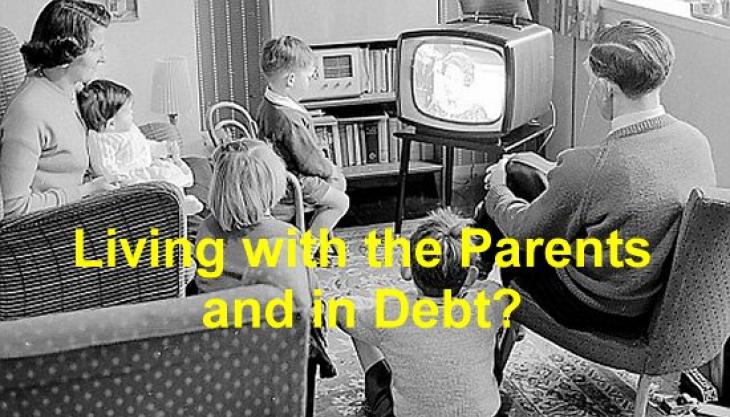Can You File Bankruptcy If You Live With Your Parents? Millennial Debt Questions Answered
Submitted by Rachel R on Mon, 07/18/2016 - 10:32am

At home with your parents? How to get out of debt
Image Source: Flickr CC User Paul Townsend
Millennials struggling to find jobs or over-burdened with student loans are moving back home in droves. To make things worse, most college graduates leave school with roughly $5000 in credit card debt – and many with more than that. One way to ditch credit card debt, medical bills, and other types of debt is to file bankruptcy, but if you’re living at home with your parents once again, are you still eligible to file North Carolina bankruptcy?
Yes, You Can File Bankruptcy while Living at Home with Parents
Bankruptcy is a serious option that should not be taken lightly, but if you can’t find full-time work, are burdened with too much debt to pay and can’t see another way out, Chapter 7 may help your situation. Living at home is no barrier to Chapter 7 or Chapter 13 bankruptcy. If you’re earning less than the amount required for a Means Test, you can automatically file Chapter 7.
If you’re living at home and not working full-time, it’s likely you won’t have an issue with this chapter. However, to qualify for Chapter 13, you must have enough income to meet the requirements of a payment plan. Typically, Chapter 13 is only filed when you have too much income to qualify for Chapter 7 or are behind on secured debt such as a mortgage or car loan.
No, You Usually Can’t Ditch Student Loans in Bankruptcy
Don’t jump into bankruptcy with an eye on ditching your student loans. Even though they’re unsecured debt, Federal law has excluded student loans from the same mandates as other unsecured debt in bankruptcy. That doesn’t seem fair, but it’s the law. Student loans can occasionally be dismissed in bankruptcy, but only in very particular circumstances.
If your college has shut down or been discredited in some way, you may be able to get a discharge. Also, if you have a serious and permanent disability that will make you unable to work, you may be able to get a discharge. However, if you are healthy and have the capacity to earn more in the future, you will likely not be able to convince the bankruptcy court to discharge your school loans.
Bankruptcy Can Put You on the Road to Long-Term Financial Success
It’s true that bankruptcy will cause your credit score to dip in the short run, but if you can’t pay your bills, are behind on credit card payments and don’t see a way out, bankruptcy may be a preferable option to carrying on as you are. Every missed credit card payment means a ding to your credit report, and your score will continue to drop for every month that you fall behind.
When you file for bankruptcy, after an initial drop your score will begin to rebound. Some studies have actually shown that scores typically rebound faster for those who file bankruptcy and move on versus those who muddle on in debt without the means to dig out. Being stuck with debt can also make it harder to find a job—you may feel the need to hold out for a higher income threshold.
Falling behind on your bills can also make it harder to find a job if your field of work requires a credit check or security clearance to obtain a position. Bankruptcy, on the other hand, is typically not held against you in a pre-employment credit check and is preferable to most employers over excessive debt.
Find out More about North Carolina Bankruptcy
If you’re back living with your parents because your debt is too much for you to deal with, you can’t afford to live on your own, and aren’t sure what your financial future holds, contact an experienced and reputable North Carolina bankruptcy attorney to discuss your options.
Come in for a free North Carolina bankruptcy consultation at the Law Offices of John T. Orcutt. Call +1-833-627-0115 now for a free no-obligation appointment at one of our convenient locations in Raleigh, Durham, Fayetteville, Wilson, Greensboro or Wilmington.
Debts Hurt! Got debt? Need help? Get started below!
Serving All of North Carolina
- Bankruptcy Attorneys Raleigh NC (North)
- Bankruptcy Attorney Fayetteville NC
- Bankruptcy Attorney Durham NC
- Bankruptcy Attorneys Wilson NC
- Bankruptcy Attorneys Greensboro NC
- Bankruptcy Attorneys Southport NC
- Bankruptcy Attorneys Wilmington NC
Bankruptcy Attorneys Raleigh NC (North)
6616 Six Forks Rd #203 Raleigh, NC 27615 North Carolina
Tel: (919) 847-9750

Bankruptcy Attorney Fayetteville NC
2711 Breezewood Ave Fayetteville, NC 28303 North Carolina
Tel: (910) 323-2972

Bankruptcy Attorney Durham NC
1738 Hillandale Rd Suite D Durham, NC 27705 North Carolina
Tel: (919) 286-1695


Bankruptcy Attorneys Greensboro NC
2100 W Cornwallis Dr. STE O Greensboro, NC 27408 North Carolina
Tel: (336) 542-5993

Bankruptcy Attorneys Southport NC
116 N Howe St. Suite A Southport, NC 28461 North Carolina
Tel: (910) 218-8682

Bankruptcy Attorneys Wilmington NC
116 N. Howe Street, Suite A Southport, NC 28461 North Carolina
Tel: (910) 447-2987
